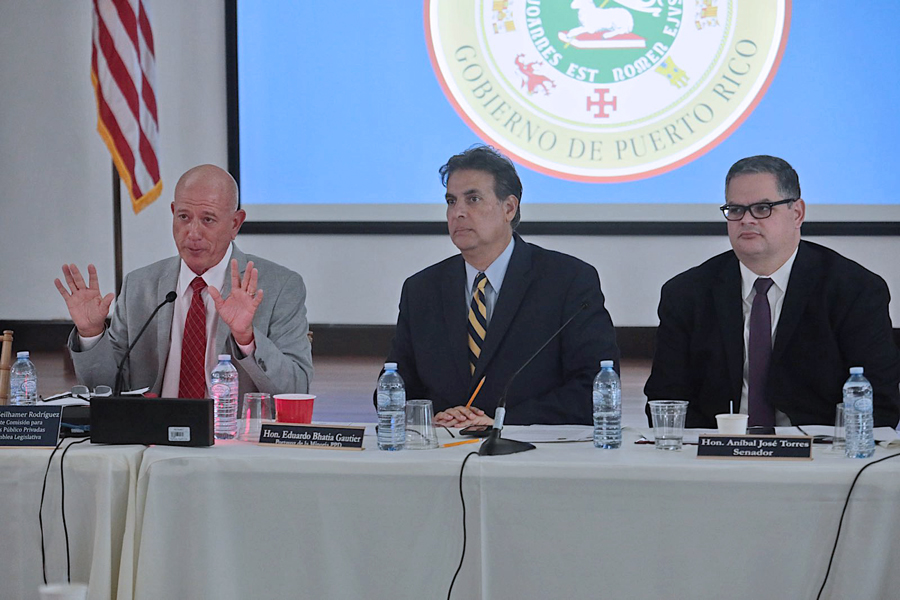P.R. Senate runs marathon hearing to gather input for PREPA transformation

The Senate’s Special Energy Affairs Committee conducted a seven-hour public hearing Thursday to gather input on what should be included in the regulatory framework required for the sale, disposal and/or transfer of the Puerto Rico Electric Power Authority’s assets, operations and functions.
Breaking from following the usual pattern of filing a bill, then holding public hearings, Committee Chairman Larry Seilhamer and Sen. Eduardo Bhatia heard expert recommendations to then submit the draft regulatory framework that will be brought to a vote in both legislative chambers.
“We do not want a fuel monopoly or a supplier monopoly,” said Seilhamer, while pointing out the the importance of the regulatory framework to provide a level playing field for private investment.
Meanwhile, Bhatia said the regulatory framework approved by the Legislature “must have a clear schedule that includes a phase-in and phase-out of energy percentages in the process of increasing renewable energy in Puerto Rico.”
Among the executives representing the government were PREPA Executive Director José Ortiz, Christian Sobrino, the head of the Fiscal Agency and Financial Advisory Authority (AAFAF for its initials in Spanish) and Economic Development and Commerce Secretary Manuel Laboy.
In his testimony, Ortiz said as part of PREPA’s economic model, “we’re not going to sell energy, but will facilitate the distribution of energy through private generators that can sell to the system.”
At present, there are eight companies interested in acquiring assets from PREPA, Ortiz told reporters.
He also recommended to the Commission that the subsidies granted to municipalities, institutions and even residential customers are evaluated.
The cost of subsidies and credits totaled $56 million in 2016, $53 million in 2017 and $42 million so far in 2018. These amounts do not include the cost of consumption by municipalities, public lighting and a flat fee for public housing, that for fiscal year 2016 was $247 million.
“There are many things you have to look at. To the extent that unnecessary subsidies can be eliminated, that will cheapen the cost of energy,” Ortiz said.
Among his recommendations were revising the concept of net metering because there are “simpler” interconnection mechanisms that could be less expensive. He also suggested establishing the scope of the transactions to be carried out related to the sale of PREPA’s power generation assets, so that no contractor can acquire more than 49 percent of what is available.
To that end, Seilhamer said Law 120 will be amended to work everything related to the PREPA sale. He asked Ortiz for documents about PREPA’s assets, their value, and which should be covered by the Puerto Rico Power System Transformation Act of 2018.
Energy Bureau a must
During his testimony, Sobrino said in June, the Public-Private Partnerships Authority surveyed the market regarding PREPA’s transactions. The result was a resounding request from investment firms for an independent energy regulator with the “typical” powers — as well as fiscal and administrative autonomy — bestowed to stateside regulatory agencies.
They also said that because “Puerto Rico doesn’t have a regulatory tradition, it is imperative that the Puerto Rico Energy Bureau (formerly known as the Puerto Rico Energy Commission) establish partnerships with energy organizations.
However, Sobrino recommended that Commission members consider legislation so that the Energy Bureau focuses on issues traditionally handled by a regulator in a market with private-sector participants.
“The Bureau as a trustee that intervenes with PREPA is not entirely necessary. What is needed is a regulator, because we’re moving to a private market,” Sobrino said. “We must ensure that the Bureau has the fiscal and administrative autonomy to operate. If the Bureau has to go to the agency that regulates it to beg for money, its role will be very difficult.”
24/7 operation
Meanwhile, Laboy said if the energy deficiencies and high costs in the short term are not adequately addressed, “there will be no economy in Puerto Rico in five years,” causing the island lose its competitive value as a destination for local and foreign investment.
“The mere opening of the energy market will lead to the establishment of new industries in the field of generation, transmission and distribution of energy. Distributing power generation at multiple points throughout the island will allow Puerto Rico to not depend on a single production source,” Laboy said, noting that manufacturing accounts for 48 percent of the island’s economic sector.
However, Laboy partially objected to the Energy Bureau’s requirement that for a renewable source to be considered a primary source of energy, it must emit 75 percent of the outgoing energy production for a one-year period.
“This is extremely high for industrial projects that require 24/7 operation,” Laboy said.













